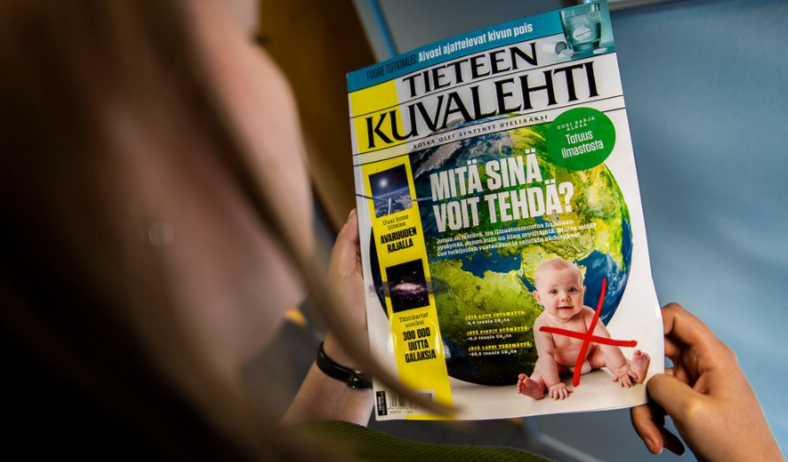It’s no longer science if it embodies cult thinking…
Politicians in Finland have criticized the 13/2019 edition of Tieteen Kuvalehti, the Finnish version of Bonnier Publications International’s Danish periodical Illustreret Videnskab, for its cover image of a baby with a red X over it, referring to a story on mitigating climate change.
Finland’s birth rate is currently at a historic low, making it a touchy subject.
The magazine’s cover article gives tips on how readers can reduce their carbon footprint. In addition to measures such as rejecting meat and forgoing air and car travel, the page-long article concludes that the single best step a climate-aware person can take is to not have children.
Call for display removal
Pekka Aittakumpu, a Centre Party parliamentarian from the northwest coastal city of Oulu, put out a bulletin asking that the magazine be “hidden” in shops, libraries and kiosks.
“I think conveying the message that a baby is a source of emissions is going too far. It gives children and youth the impression that they are a burden, and I find this horrible,” Aittakumpu told the Finnish Broadcasting Company Yle.
Christian Democrat parliamentary Päivi Räsänen also commented on the cover in a Facebook post.
“The message of the cover image is offensive to babies and families with babies […] Children that are well cared for and educated will come up with the solutions to future problems, not be the cause of them. I support a counterattack to propaganda of this nature that says ‘All babies are welcome!'” she wrote.
Yle was unable to reach any Tieteen Kuvalehti personnel to comment on the matter. Bonnier publishes a version of the magazine in Sweden, Norway, Denmark, Iceland, Latvia, Lithuania, Greece, the Netherlands, and Belgium. In the USA, Australia, and New Zealand, the magazine is sold under the title Science Illustrated. Global circulation is in the neighbourhood of 550,000 copies.
Rock-bottom fertility rate
Statistics Finland’s most recent report on Finland’s birth rate shows that the number of births in Finland fell for the eighth year in a row in 2018. The service said that if last year’s fertility rate was used as a benchmark, a woman of childbearing age in Finland would give birth to just 1.41 children on average.
This 2018 figure was a clear drop on the previous year, when the figure was 1.49. The historic low threatens Finland’s overall population levels as well. From January to April, the number of births was lower than the number of deaths.
A few years ago, a study from Lund University in Sweden claimed that a decision to have one fewer child is the most effective personal carbon footprint mitigation action one can take.
The study has since been roundly criticised. Researcher Jáchym Judl from the Finnish Environment Institute SYKE for example makes the case for a humane solution that doesn’t “blame people for reproduction”, as “it all comes down to (sustainable) consumption and production”.
“Personal carbon footprint is a function of income, individual consumption choices, and the carbon intensity of products and services that are consumed. When comparing two citizens in a given year, both with a similar income, their personal carbon footprints will be a result of the consumption choices they make, regardless of the number of kids they have,” Judl writes.
“Finland cannot shirk its responsibility”
Helsinki University’s world politics professor Teivo Teivainen says that it is clear that fewer births would lead to lighter load on the planet, but he says this doesn’t mean that the decision to have children would be morally objectionable.
“The decision to have children includes many ethical considerations. Finland cannot shirk its responsibility, however, by stating that our birth rate has no significance on the global scale because we are a small nation.”
He points out that science oftentimes calls attention to issues that bring our society’s morals into question.
“The cover asks ‘What can you do?’; it doesn’t say ‘What you should do’. There’s a difference,” he said.

